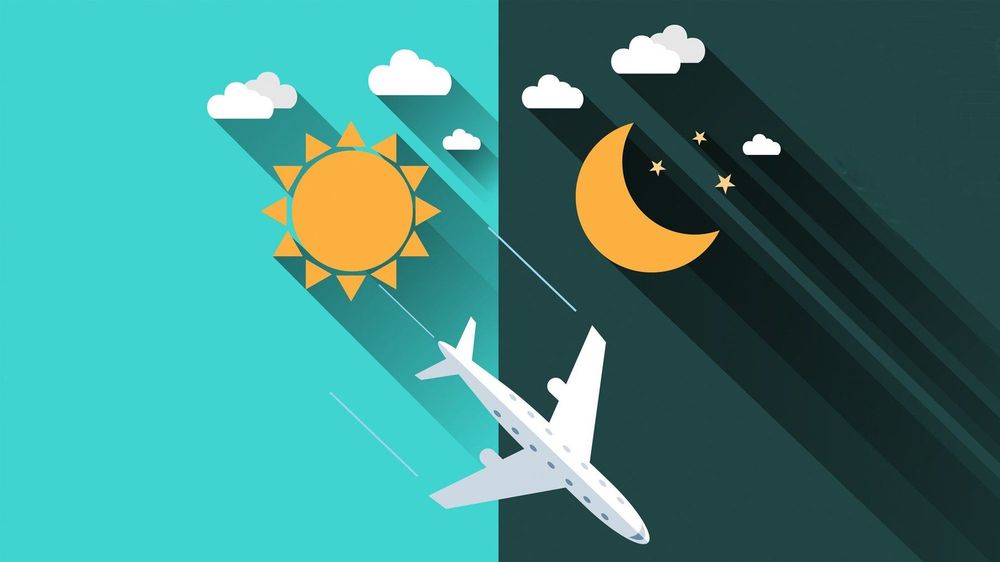This is an automatically translated article.
Jet lag can cause daytime fatigue, feeling unwell, difficulty staying awake, and gastrointestinal problems. Jetlag while traveling is often temporary, but can still significantly reduce the comfort of your vacation or trip.
1. What is Jet lag?
Jet lag is a temporary sleep problem that can affect anyone quickly traveling across multiple time zones causing the body to enter a time zone difference.
Your body has a circadian clock to signal when to wake up and when to sleep. Flight lag occurs because your body's clock remains synchronized with your original time zone, rather than with the time zone where you traveled. The more time zones you cross, the more likely you are to be delayed due to time zone delays.
Jet lag can cause daytime fatigue, feeling unwell, difficulty staying awake, and gastrointestinal problems. Jetlag while traveling is often temporary, but can still significantly reduce the comfort of your vacation or trip.
2. Symptoms of jetlag while traveling
Symptoms of Jet lag can vary. You may experience only one symptom, or you may have multiple symptoms. Jet lag symptoms may include:
Disturbed sleep- such as insomnia, early awakening or excessive sleepiness; Daytime fatigue; stomach problems , constipation or diarrhea ; general feeling of being unwell; Mood change. Jet lag symptoms usually occur about 1 or 2 days after you have traveled across at least 2 time zones. Symptoms may get worse the more time zones you travel, especially if you travel east.
Jet lag is temporary, but if you travel frequently and experience Jet lag constantly, you can see a health professional so Jet lag related issues can be rectified.
3. Causes of Jet lag
The body's circadian rhythm must self-regulate. Jet lag can happen anytime you cross 2 or more time zones. Jet lag occurs because crossing multiple time zones causes your circadian rhythm, which regulates your sleep-wake cycle, out of sync with the time in your new location.
Effect of sunlight. An important circadian rhythm effect may include sunlight. Because light affects the regulation of melatonin - the hormone that helps synchronize cells throughout the body. Certain cells in the tissue at the back of your eye (retina) transmit light signals to the hypothalamus. At night, when the signal of light is weaker than during the day, the hypothalamus tells the pineal gland (a small organ located in the brain that releases melatonin. During the day, the pineal gland secretes very little melatonin. easily adjust to your new time zone by exposing yourself to daylight in the new time zone, as long as the light timing is done properly
Pressure and atmosphere in the engine cabin cause jetlag Some studies show that changes in cabin pressure and altitude associated with air travel can contribute to some symptoms of jet lag, regardless of travel. switch time zones.

Bầu không khí trong cabin máy bay có thể gây nên tình trạng jetlag khi đi du lịch
4. Jet lag risk factors
Factors that increase your chances of experiencing Jet lag include:
Number of time zones crossed: The more time zones you cross, the more likely you are to be late. Heading east: You may find it more difficult to fly east, when you "lose" time, than to fly west, when you have more time. Frequent flyers: Pilots, flight attendants, and business travelers are most likely to experience jet lag. Older adults: Older adults may need longer to recover from a jet condition than younger adults.
5. Jet lag treatment
Jet lag is generally a temporary condition and usually does not require treatment. Symptoms usually improve within a few days, although sometimes they last longer. However, if you are a frequent traveler who is constantly bothered by planes, your doctor may prescribe light therapy or medication.
Light therapy Body circadian rhythms are affected by exposure to sunlight. As you move across time zones, your body has to adjust to the new daylight schedule and reset, allowing you to fall asleep and wake up at the appropriate times. Your doctor may recommend light therapy. The therapy would then involve exposure to artificial light or lamps that simulate sunlight for a specific and regular period of time when you want to be awake.
Light therapy comes in many forms, including a table-top light box, a table lamp, or a light visor that you wear on your head. For example, light therapy can be helpful if you are a business traveler and often stay out of natural sunlight during the day in a new time zone.
Medication use Non-benzodiazepines, such as zZolpidem (Ambien) and Eszopiclone (Lunesta), Midazolam (Nayzilam) sometimes called sleeping pills - can help you sleep during the flight and for several nights afterward. Side effects from these drugs are uncommon, but can include nausea, vomiting, memory loss, sleepwalking, confusion, and morning sleepiness. While these drugs seem to help prolong sleep duration and quality, they may not relieve daytime symptoms of jet lag. These drugs are usually only recommended for people who have not tried other treatments that help.
Sunlight Use sunlight to reset your body's circadian rhythm - nature's most powerful tool for regulating sleep-wake cycles. Exposure to morning light can often help you adjust to an earlier time zone (going east), while evening light helps you acclimatize to a later time zone (going west). Plan ahead to determine the best time for light exposure based on your departure and arrival points and overall sleep habits.
Before your trip you can start light therapy up to 2 days before travel to adjust to the new time zone before reaching your destination. If you're traveling east, try waking up about 1 hour earlier than your usual wake-up time and exposing yourself to at least 1 hour of light. Do this daily until you depart for your trip. You should also adjust your bedtime to 1 hour earlier each night if possible. To travel West, delay your wake-up and bedtime times.
At the destination, if you have traveled east and crossed 3-5 time zones, try avoiding bright daylight in the morning. If you're crossing more time zones or traveling West, avoid glare the morning of arrival, but seek out early afternoon sun. During the day, dark glasses can help block out light when you need to avoid exposure. At night, draw curtains or window blinds or use a sleep mask. For each day of your trip, gradually shift your exposure to light earlier. Combining light exposure with exercise like walking or jogging can help you adapt to new times more quickly.
Melatonin Alternative-a travel jetlag remedy and sleep aid, melatonin has been extensively studied and is now a generally accepted part of the treatment of jet lag. effective. The latest research seems to indicate that melatonin aids sleep during times when you're normally not rested, which could be beneficial for people who are late for a plane. The body sees melatonin as a signal of darkness, so melatonin generally has the opposite effect of bright light. When you take melatonin is very important. If you're trying to reset your body clock to an earlier time, such as after flying east, it's a good idea to take a melatonin supplement at your local bedtime every night until you like it. with local time. If you're trying to reset your body clock to a later time, such as after flying west, it's a good idea to take melatonin in the morning.
Small doses of 0.5 milligrams seem to be just as effective as doses of 5 milligrams or higher, although higher doses have been shown by some studies to promote more sleep. If you take melatonin, take it 30 minutes before bed or ask your doctor about the right time.
Avoid alcohol while taking melatonin. Side effects are uncommon but can include dizziness, headache, daytime sleepiness, loss of appetite and possibly nausea and disorientation.

Khi gặp tình trạng jetlag khi đi du lịch thì bạn có thể tham khảo một số phương pháp điều trị
6. Jet lag prevention
Here are some ways to help you prevent jetlag while traveling:
Gradually adjust your schedule before you hit the road. If you're traveling east, try to go to bed 1 hour earlier each night for a few days before you depart. Go to bed 1 hour after a few nights if you are flying West. If possible, eat meals close to the time you will be eating them at your destination. Adjust exposure to glare. Because light exposure is one of the main influences on your body's circadian rhythms, adjusting to light exposure can help you acclimate to your new position. In general, exposure to light in the evening helps you adjust to a later time zone than usual (going west), while exposure to morning light can help you acclimate to an earlier time zone ( go east). Keep your new schedule by setting the clock to the time in the new location before you leave. Once you've reached your destination, try not to sleep through the local night, no matter how tired you are. Furthermore, you should try to schedule your meals according to local meal times. Stay hydrated before, during and after your flight to counteract the dehydrating effects of dry cabin air. Dehydration can make jet lag symptoms worse. You should avoid alcohol and caffeine, as they can dehydrate you and affect sleep. Try to sleep on the plane and wear earplugs and an eye mask that can help block out light and noise. In short, when you're flying across multiple time zones for a few hours, you're moving faster than your body clock adjusts. When your body is out of sync with the new time at the destination, you can experience problems related to sleep as well as other states of the body.
Please dial HOTLINE for more information or register for an appointment HERE. Download MyVinmec app to make appointments faster and to manage your bookings easily.
Reference sources: webmd.com, mayoclinic.org












